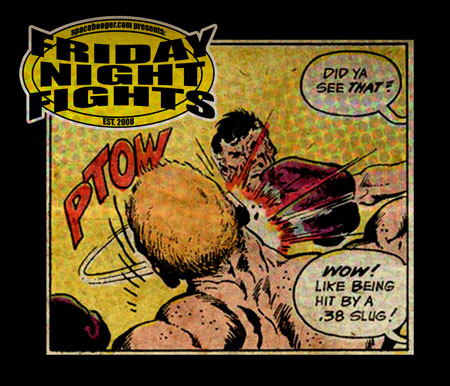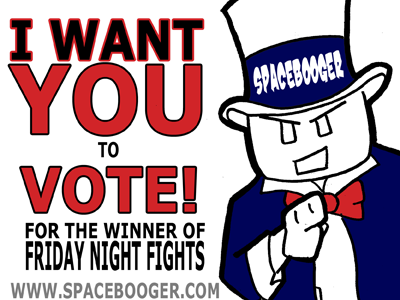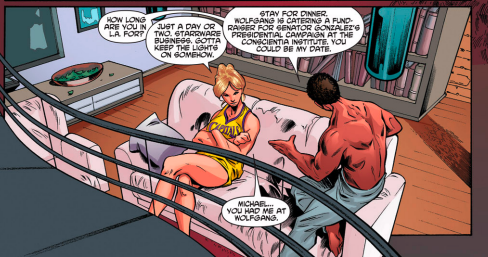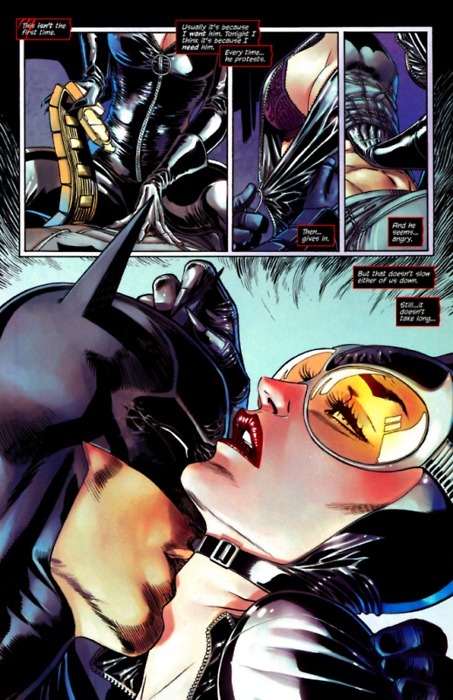Out of the 40 DC comics that have debuted so far, I give 22 of them a favorable rating ("All In" or "Probation"). Some of the books were fun-filled triumphs. Others were average. And others were among of the worst comics I've ever seen. From my perspective, I'd say the rebooted DC books have been a mixed bag.
However, The operative words in that last sentence are "from my perspective". Said perspective being that of a straight white male.
But when I step back and picture how those same 40 books must look like from a female perspective? Let's just say, the picture looks pretty damn bleak.
I'm not talking the female-centric books or characters that were cancelled, erased, or exiled into Limbo in the wake of the reboot (the original Birds of Prey, the Steph Brown Batgirl book, Power Girl, Zatanna, Scandal and Jeanette in Secret Six) or pre-reboot characters erased or exiled into limbo.
I'm talking about what's replacing them.
Of the 52 titles debuting in September, I counted a total of six female solo books, compared with twenty-six solo male character books. In addition, one additional book, Birds of Prey, features an all-female team. As far as I can tell, the sum total of female writers or artists on DC books this September was Gail Simone.
Let's take a look at how female characters fared in the New 52 this month so far.
THE GOOD
I've got to be fair-minded. There were some beautiful gems here:
Batwoman - This book FINALLY came out this month. And it came out strong.

Sure, I miss Greg Rucka, and I'm not entirely sold on the prospect of a Kate-Maggie relationship (for reasons which will become more obvious as this post progresses), but all-in-all, this book is wonderful.
Wonder Woman - The big controversy raging over this book was the "pants vs. no pants" debate. Personally, I don't care about that when Diana is depicted as well as
this.
The only caveats I have regarding this book are 1) I could have done without the decapitation and beheading and 2) it seemed a little light on dialogue and exposition. Cliff Chiang, whose work was beautiful here, eased the former problem significantly by not indulging in gore porn. Also,
not seeing the Amazons raped in the first issue?
Major step up from the Perez reboot.
Birds of Prey - Let's be honest. I miss the pre-reboot version terribly. I miss Oracle. And Helena. And Zinda. And how they interacted. And Gail Simone writing them. Thing is, if I step back and look at the new Birds book, I have to concede it's a pretty strong work in its own right. The new girl, Starling, needs a little more to define and differentiate her, but I'm liking her so far. And
Dinah? See for yourself.
I'll admit her outfit was in flagrant violation of the
Ron Frenz Rule of Costume Design, but it wasn't degrading. Also, as you can see above, Jesus Saiz is at the top of his game here.
Justice League International -
A 5-4 male/female ratio? Not too shabby. Also, notice Vixen's new outfit. Compare it with her last one. I'll wait.
Miscellaneous - We saw the first signs of some of the best female characters making it through the reboot intact. In Blue Beetle, we saw the return of two of my favorite DC women, Bianca Reyes and La Dama. Animal Man brought back Ellen Baker, albeit in a small role in issue#1. An unnamed Caitlin Fairchild was in the Superboy book, without the oversexualization. I've loved Maggie since the Byrne Superman days. And even OMD'd, Lois is still....Lois.
THE BAD
Batgirl - For more of my opinion on the first issue, click
here. Suffice it to say:
This?
 |
| "Hellooo? Still in the room?" - The killer |
Not a shining moment for heroic female characters.
Green Lantern Corps - From a male point of view, this was a solid, if sometimes overly gory, read.
One problem:
Among those featured on the cover? Arisia and Soranik Natu. Among those nowhere to be found in the actual interior story?
Arisia and Soranik Natu.
Supergirl - I'll say this for
Supergirl#1: It was better than Kara Zor-El's last debut in
Batman/Superman#6-10. Trouble is: That's
not saying much. The art was good, but the book had two major problems. First of all, the story was decompressed as hell. It was "Supergirl lands on Earth and fights some armored guys". That was it. Normally, when the main story in a #1 is so thin, that should mean writers are cutting away from it a lot to introduce other characters and subplots. That wasn't the case here; the focus was all Kara, all the time. Geez, Hector in
The Iliad wasn't dragged out this much. But that wasn't what landed Kara in "The Bad" section. What did it was the costume. That outfit made her look
bare-assed in anything even
resembling a side shot. Not a good look for a teenaged girl.
THE EXTREMELY UGLY
Fasten your seatbelts.
Mr. Terrific - Meet
Karen Starr. Before the reboot, she was
Power Girl, one of the strongest heroines in the DCU.
After the reboot?
She's
Michael Holt's "friend with benefits".
(Brace yourselves: This is going to be a recurring theme.)
Catwoman - We've seen the relationship between Bruce and Selina portrayed many times before, but we've never seen it....
.... as
rape fantasy porn.
And let me be perfectly clear: This is
NOT A GOOD THING!
"The Cat And The Bat" have had a flirtatious and playful relationship for decades, going all the way back to 1940. I've been a big fan of it going all the way back to Adam West and Julie Newmar. True, they have had more than their share of sexual tension. But their relationship in canon was never sleazy and degrading enough to make the reader want to vomit after reading about it.
Until now.
Congratulations,
Judd Winick and
Guillem March!
Also: "It doesn't last long"? Too. Much. Information.
I'm surprised March or the letterer didn't add "BOW CHICKA BOW BOWWWW!" as a sound effect.
Starfire - Here's a scene from MAXIM FHM Sports Illustrated Swimsuit Issue Red Hood And The Outlaws#1:
Yeah,
that was a vital piece of the storyline.
Look, I'm not begrudging cheesecake in comics. I'm a huge fan of
Mike Grell, for heaven's sake! And, to be fair, there's been a strong cheesecake element to Starfire since Marv Wolfman and George Perez introduced her. The thing is, they still made her a fully realized character. The last Starfire comic I picked up before seeing
Red Hood was
New Teen Titans Annual#1, in which she fought her sister to the death. We saw the cheesecake, but you know what we also saw? A fierce warrior and a strong, resolute,
heroic character.
But here? Scott Lobdell threw all Kory's personality out the window and turned her.....
 |
| "Dustin"? |
... into a sexbot!
Actually, I take that back. The "Build-A-Friend" robot in OMAC#1 displayed much more agency than Kory does here.
Apparently, DCnU Kory is so unable to distinguish between human males that she'll hook up with anyone. And love, and emotional connection or involvement, ain't got nothin to do with it. Which is the exact opposite of Wolfman and Perez' portrayal of either her or her fellow Tamaraneans. No emotional involvement? Emotional involvement are at the core of her very BEING.
Taking away emotional involvement from Koriand'r is like taking away the desire to help people from Superman. Or taking away bravery from the Green Lanterns.
The Starfire shown in Red Hood #1 wasn't a real character. She was a male fantasy. She couldn't have been more so if she followed each hookup by morphing into a pizza and a six-pack of beer.
Actually, let me correct that: She wasn't a male fantasy. She was a douchey male fantasy. That's an important distinction.
Allow me to clarify: I read
Laura Hudson's moving post at Comics Alliance Thursday. It was part of the inspiration for this post because reading it triggered a wide variety of reactions in me. Among those were sympathy, anger, and frustration. But it also triggered something I'll call
The "We're Not All Like That" Reflex. A person's
"We're Not All Like That" Reflex is a defensive reaction that often occurs when hearing or reading someone's account of a bad experience or series of bad experiences with people in your particular demographic. Example: many Muslims undoubtedly had this reflex triggered after 9/11. Depending on the situation, you may or may not want to stifle this reflex when it hits, as it may or may not be appropriate in light of the other person's bad experience.
In my case, my "We're Not All Like That" Reflex was brought on by my status as a straight male or, more specifically, a straight male superhero comics fan. Let's face it: There are a lot of douchey males in general, and in comics fandom in particular. (Although not all or even most.) They're the arrested adolescents who give the rest of us a bad name. They're the types who do misogynistic things. Like bullying and harrassing women at comic conventions, on the streets, and even online. Like victim-blaming in rape cases or even committing rapes themselves. Or high-fiving each other about their sexual conquests. Or putting women into degrading scenarios. And especially insisting that the comics medium cater to
THEIR every fantasy to the exclusion of everyone else's.
They're the loudest, most vocal and, unfortunately, the most memorable. They leave the biggest lasting impression. And worst of all, they also do the most damage to women in their wake. In light of the scope of that damage, it's usually best for the rest of us menfolk to try to stifle that "We're Not All Like That" Reflex, natural and valid as might be, because how those actions affect men's image ranks
dead last as far as what we need be concerned about.
But sometimes actually expressing this "We're Not All Like That" Reflex can serve another purpose. It can serve as a reassurance to women that they are not alone in their concern and frustration with the status quo. It can serve to add additional voices to a rising chorus for change. And it can serve to put douchey males and those who pander to them on notice.
Too often, superhero comics have been among those pandering to this
"douchey male" demographic, especially in recent years. Couple the rash of women as "fuck-buddies" engaged in emotion-free trysts in the New 52 with the erasure of marriages like Clark/Lois and Barry/Iris, and you can see a trend of
arrested adolescence at work. The problem is that, in the case of DC's recent offerings, this mentality reaches up all the way to the top.
Contemplate this: Winick, Lobdell, and the rest didn't just publish these issues on their own as a pirate company. Both
Red Hood#1 and
Catwoman#1 had to be
approved at several levels before they could see print.
Editors. Group Editors. CEO's and Publishers. They all signed off on these two comics because they found nothing objectionable in them. If they had found something they felt
was too objectionable with the content,
at any stage, those books wouldn't have been published.
Period.
Just ask
Chris Roberson about the original
Superman#712.
You may remember
Superman#712 as the one that was supposed to feature Superman teaming up with a Muslim hero named
Sharif. For mysterious reasons, it was pulled at the last minute and replaced with a filler story about Krypto. On a recent
War Rocket Ajax interview, Roberson revealed a crucial piece of the "Grounded" saga that was in that original issue: Superman concluded the issue asking Sharif if it would be easier if Sharif had assumed a hero identity that didn't call attention his heritage, at which point Sharif responded by pointing out that Supes himself, by virtue of his public hero identity, calls attention to his alien heritage. The heritage of an alien race that had recently attacked Earth, no less. See the parallel?
Why was this so important? Because the beginning of the next issue,
Superman#713, has Supes announce to Superboy and Supergirl his decision to
abandon his Superman identity and just do his heroics
anonymously. That's a
big decision. But without seeing the
inspiration for the move, it looked to readers like Supes just
pulled this decision out of his ass.
And so this crucial piece of a 14-part story arc involving one of your flagship characters was sacrificed, and for
what? Despite the shifting reasons given by DC, the real answer was obvious: To avoid offending a minority of Islamophobic Americans still sore over Superman's citizenship decision in
Action Comics#900.
And yet DC had
no such concern about the release of Catwoman and Red Hood. In DC's eyes,
Islamophobes were important enough to fear offending, but
women, who constitute
52% of the world's population, weren't.
Let that swim around in your heads for a moment. Potentially offensive to
Islamophobes?
KILL IT! Potentially extremely offensive to
women?
LET IT FLY!
Look at what female comic fans have to deal with: They have a substantially smaller pool of heroes in their gender to choose from to begin with. Then they have to weed out the ones that don't repel them. The ones without the vacant-eyed stares, porn faces, hypersexualized poses, and impossible anatomies.
And then, when they
do find strong, well-written heroines, they have to deal with the harsh reality that their favorites are always
one hack writer and/or exploitative artist away from being killed off, degraded, villainized, objectified, hypersexualized, raped, or otherwise abused in really horrible ways. Sure, male characters are also vulnerable to mishandling due to creative team changes, but nowhere close to the same degree female characters are. Without editors and management stepping in to protect those heroines, how well or badly they'll be treated is a
crap shoot.
Just ask
Sue Dibny.
Or just ask the post-reboot Amanda Waller.
How bad is this problem at DC? Let's put it this way: My
last post was a
Friday Night Fights entry featuring
Planetary's Jakita Wagner. What you don't know is that my entry's original title when I started composing it on Tuesday was "PLEASE Tell Me This Woman's In The New DCU!". After reading Red Hood and Catwoman, however, I changed the title to "Vehicular Assault". Why? Because after reading those two comics, I'm honestly not sure I
WANT Jakita in the new DCU if that's how she could be treated. I shudder to think who DC might assign to handle that character
besides Warren Ellis and John Cassaday, and how badly she might be treated as a result. I'm
that shell-shocked.
And I'M a straight white male, folks. And a longtime superhero comics fan to boot.
Re-read the tail end of Laura Hudson's post to see how drained she was. And she is also a longtime superhero comics fan.
Now imagine an African-American female wanting to read about
Voodoo, the sole black heroine in the new DCU with her own solo book. Imagine her enthusiastically going to check out this heroine's adventures....
....and seeing her in
"powerful and heroic" poses like
THIS.
Or THIS.
Or
THIS.
If this woman is not a longtime reader, chances are she'll not only shun Voodoo, but shun the rest of DC's superhero books as well. And maybe superhero comics or even comics in general. Including even positive female books like the new Wonder Woman, Batwoman, and Birds of Prey.
Because that's how first impressions work. DC apparently thinks that bad press helps them just as much as good press, but that couldn't be further from the truth. Positive first impressions attract. Negative first impressions repel. And negative impressions are far more powerful than positive ones. That's just a fact of life.
Look no further than the images I've shown you in this very post. Which ones do you think will resonate most strongly in your mind? Especially if you're a female reader?
Books like Red Hood#1 and Catwoman#1 are like a sign that says different things depending on who's viewing it. To douchey males, the sign reads "WELCOME (WINK, WINK)". To longtime fans of those characters (like myself), the sign reads "FUCK YOU". And to women and girls, the sign reads "KEEP OUT".
The DC reboot was the company's "Hail Mary" pass to attract new readers because the existing readership wasn't enough to sustain them.
Actively driving away more than half of that potential audience? That's just bad business!















































